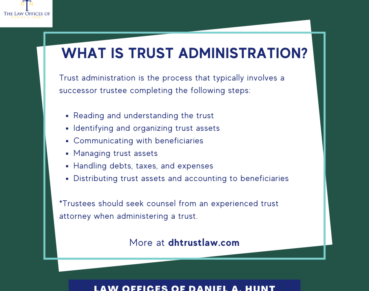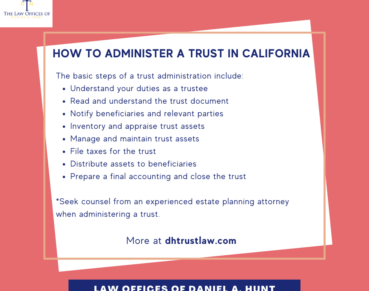A Complete Guide to Trust Settlement Agreements for 2021
Creating a trust is one of the best ways to distribute your property after your death while avoiding the probate process in California. There are many different types of trusts you can use to meet your goals, including irrevocable living trusts, revocable trusts, special needs trusts, life insurance trusts, and many more.
Sometimes a trust does not work as it was originally intended. There could be clerical errors or factual errors in the trust agreement. Alternatively, the circumstances surrounding the trust or its distribution may have changed in an unforeseen way. Instead of engaging in a lengthy and expensive litigation process, the beneficiaries may agree to a non-judicial settlement agreement as an optimal solution. The following is a guide to trust settlement agreements.
What is a Trust Settlement Agreement?
A trust settlement agreement, also called a non-judicial settlement agreement, is a contract between the trust’s beneficiaries. According to the trust agreement, the beneficiaries of the trust are the people or nonprofit institutions who received assets from the trust. Non-judicial settlement agreements allow the trust beneficiaries to resolve disputes regarding the terms of the trust while avoiding the need for litigation.
A trust settlement agreement can also provide everyone involved flexibility. The beneficiaries can circumvent the unduly burdensome need to transfer estate assets to the trust then transfer the same assets to the beneficiaries from the trust. This scenario arises when a pour-over will require all of the estate assets to be transferred to the trust after the decedent passes away. A trust settlement agreement allows the beneficiaries to avoid transferring assets in and then out of the trust, an expensive and time-consuming process.
Who Can Enter a Trust Settlement Agreement?
Any person can enter into a non-judicial settlement agreement that is legally binding. These types of settlement agreements do not need to be supported by consideration. However, a non-judicial settlement agreement is only legally valid when all persons whose interest in the trust would be affected by the agreement’s provisions are parties to the settlement agreement. In other words, the settlement agreement cannot only be among some of the trust beneficiaries. Instead, all interested parties and beneficiaries must agree with the terms of the non-judicial settlement agreement for the trust agreement to be valid.
Benefits of a Trust Settlement Agreement
Many benefits come from entering into a trust settlement agreement. The settlement agreement gives everyone involved versatility regarding the matters the agreement addresses. The non-judicial settlement agreement can address many different legal matters, including, but not limited to, the following:
- Interpretation of the terms of the trust agreement
- Directions to a trustee to stop performing an act
- Granting a trustee power
- Determining the trustee’s compensation
- Distributing the trust corpus
- Transferring a trust principal place of administration
- The liability of a trustee for an action related to the trust
Not every legal issue can be handled in a trust settlement agreement. One crucial requirement for a trust settlement agreement is that their provisions cannot violate a material purpose of the trust or any California laws. As long as these requirements are met, any interested parties can request that the court approve a non-judicial settlement agreement, giving the agreement the court’s final stamp of approval. Approval by a court is not legally necessary, but it could provide the trust beneficiaries additional peace of mind that the conflict has been resolved for good.
Trust Settlement Mediation
If you cannot agree on the provisions of your trust settlement, you may benefit from going to mediation, whether court-ordered or voluntary. Mediation is a process in which a neutral third party facilitates communication between disputing parties to help them reach a mutually acceptable agreement.
When one party challenges a California trust, they will need to file a trust contest in the Superior Court’s probate division in which the decedent lived, or where the trust is being administered. Depending on the case, it may also be filed in the Civil Division of the Superior Court. The court overseeing the litigation may order the parties to mediation to encourage them to settle their lawsuit. In many cases, the parties can reach a settlement agreement. Settlement agreements do not have to be approved by the court, but it is often a wise practice to ask the court to approve them.
Your Trust Agreement Must be in Writing
Whether you go through a mediation process or negotiate using your trust attorneys, the final trust agreement must be in writing. The mediator will typically create a document at the end of the process that includes a short summary agreement during the mediation process. This agreement is called a settlement agreement and all parties will be required to sign.
In other cases, the parties will agree that their lawyers will work together to draft a final settlement agreement. Once the parties reach a settlement agreement, discovery proceedings will typically stop, and one party will need to inform the court that a settlement has been reached. Courts will enforce a valid trust settlement agreement.
Discuss Your Case with a Trust Lawyer
Entering into a trust settlement agreement can give you a versatile and effective way to modify an irrevocable or revocable trust. These types of agreements are also effective for settling disputes. Many trust settlements resolve issues regarding the interpretation of a trust agreement or the administration of the agreement.
Whether you are a trust beneficiary or a trustee, it is wise to discuss your case with an experienced estate litigation lawyer. At the Law Office of Daniel Hunt, we have helped many Californians navigate complex trust element matters. Contact us today to schedule your initial consultation.
Law Offices of Daniel A. Hunt
The Law Offices of Daniel A. Hunt is a California law firm specializing in Estate Planning; Trust Administration & Litigation; Probate; and Conservatorships. We've helped over 10,000 clients find peace of mind. We serve clients throughout the greater Sacramento region and the state of California.




